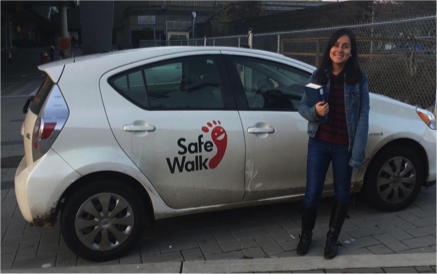UBC AMS Safewalk sees progress after introducing a new suspension policy
Safewalk had been overwhelmed by some clients’ misuse
VANCOUVER – Safewalk is back on track at the University of B.C. after the student society put new rules in place to stop people misusing the service.
Safewalk, a service that provided companions for students, staff and visitors on campus if they felt unsafe, had been overwhelmed by some clients’ misuse. That included clients making repeated calls during a short time frame, arriving late at the designated meeting location, and calling in massive groups. That was preventing the service, run by the AMS Society, from reaching all clients on time and responding to as many people as possible.
“We wanted to put caps on the misuse and make it a fair playing field for anyone using the service” said AMS Safewalk co-ordinator Elizabeth Riegert.
UBC AMS Safewalk introduced penalties for those misusing the service on Nov. 1. If people don’t follow Safewalk’s new policies aimed at spacing out calls, meeting walk companions promptly and reducing service to groups, they will be facing warnings and the possibility of getting suspended from using the service.
Since penalties introduced, abuses have dropped
Safewalk has seen a drop in the misuse incidents since the penalties were introduced.
“The amount of time safewalkers spend waiting for their clients and the number of times students have been calling per night have been decreasing,” said AMS student services manager Hussam Zbeeb.
Zbeeb said that while clients have misused the service in past years, the problem had increased recently but there were no penalties spelled out.
“We were not able to hold clients accountable,” he said.
Both Riegert and Zbeeb agree that Safewalk has been more efficient since the penalties were introduced.
“The time it takes to pick someone up and drop them off at the destination is now 15 to 20 minutes. In the past, average transfer duration was 30 to 40 minutes,” said Riegert. More people have also been able to reach the service.
Students are divided over the effectiveness of the penalties
Graduate student Veronica Hurtado uses Safewalk and agrees with the new rules.
“Since the penalties, my calls to request the service have been answered and I haven’t had to deal with the delay that I used to experience from time to time,” said Hurtado.

However, fourth-year computer-science student Aayush Sorathia worries that the penalties will affect those who need to access the service, and she referred to the occurrence of sexual assaults across campus.
“The changes placed in the system do not make sense,” said Sorathia. “The service is there for people when needed. Having a grace period before you request the service again makes it difficult for those who might be facing a tough situation — particularly women — and can’t wait for the grace period to be over.”
Currently Safewalk hasn’t received any negative feedback on the new penalties.
“We have to balance the pros and cons when a client misuses the service,” said Zbeeb. “People respecting the service get the priority. It’s a reality that we are dealing with.”
The Alma Mater Society is now focusing on ongoing advertisements to remind people that the service is available to them.
